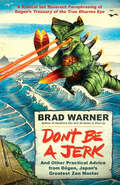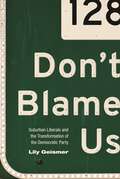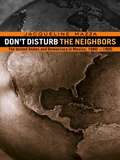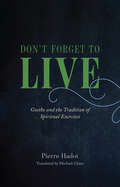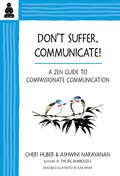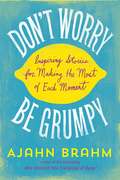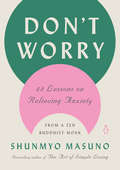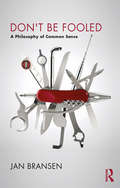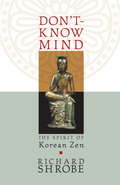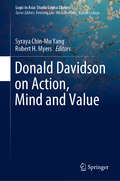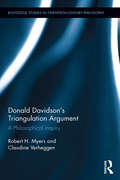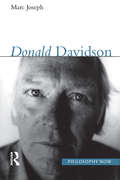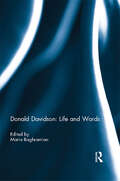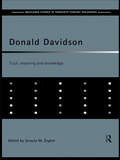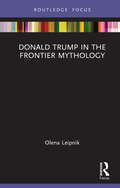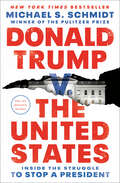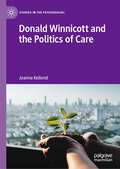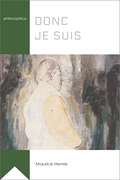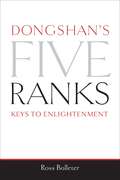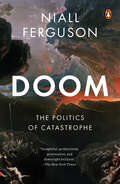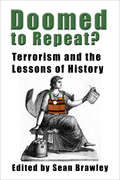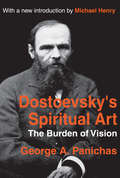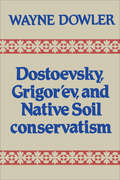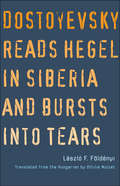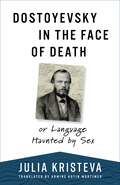- Table View
- List View
Don't Be a Jerk: And Other Practical Advice from Dogen, Japan's Greatest Zen Master
by Brad WarnerThe Shōbōgenzō (The Treasury of the True Dharma Eye) is a revered eight-hundred-year-old Zen Buddhism classic written by the Japanese monk Eihei Dōgen. Despite the timeless wisdom of his teachings, many consider the book difficult to understand and daunting to read. In Don’t Be a Jerk, Zen priest and bestselling author Brad Warner, through accessible paraphrasing and incisive commentary, applies Dōgen’s teachings to modern times. While entertaining and sometimes irreverent, Warner is also an astute scholar who sees in Dōgen very modern psychological concepts, as well as insights on such topics as feminism and reincarnation. Warner even shows that Dōgen offered a “Middle Way” in the currently raging debate between science and religion. For curious readers worried that Dōgen’s teachings are too philosophically opaque, Don’t Be a Jerk is hilarious, understandable, and wise.
Don't Blame Us: Suburban Liberals and the Transformation of the Democratic Party (Politics and Society in Modern America #109)
by Lily GeismerDon't Blame Us traces the reorientation of modern liberalism and the Democratic Party away from their roots in labor union halls of northern cities to white-collar professionals in postindustrial high-tech suburbs, and casts new light on the importance of suburban liberalism in modern American political culture. Focusing on the suburbs along the high-tech corridor of Route 128 around Boston, Lily Geismer challenges conventional scholarly assessments of Massachusetts exceptionalism, the decline of liberalism, and suburban politics in the wake of the rise of the New Right and the Reagan Revolution in the 1970s and 1980s. Although only a small portion of the population, knowledge professionals in Massachusetts and elsewhere have come to wield tremendous political leverage and power. By probing the possibilities and limitations of these suburban liberals, this rich and nuanced account shows that—far from being an exception to national trends—the suburbs of Massachusetts offer a model for understanding national political realignment and suburban politics in the second half of the twentieth century.
Don't Disturb the Neighbors: The US and Democracy in Mexico, 1980-1995
by Jacqueline MazzaFirst published in 2001. Routledge is an imprint of Taylor & Francis, an informa company.
Don't Forget to Live: Goethe and the Tradition of Spiritual Exercises (The France Chicago Collection)
by Pierre HadotThe esteemed French philosopher Pierre Hadot’s final work, now available in English. With a foreword by Arnold I. Davidson and Daniele Lorenzini. In his final book, renowned philosopher Pierre Hadot explores Goethe’s relationship with ancient spiritual exercises—transformative acts of intellect, imagination, or will. Goethe sought both an intense experience of the present moment as well as a kind of cosmic consciousness, both of which are rooted in ancient philosophical practices. These practices shaped Goethe’s audacious contrast to the traditional maxim memento mori (Don’t forget that you will die) with the aim of transforming our ordinary consciousness. Ultimately, Hadot reveals how Goethe cultivated a deep love for life that brings to the forefront a new maxim: Don’t forget to live.
Don't Suffer, Communicate!: A Zen Guide to Compassionate Communication
by Cheri Huber Ashwini NarayananThis is a Zen guide to the principles of compassionate communication. Communication is among the most common yet difficult challenges humans face. Effective communication is rarely a simple give-and-take of information because of interference from individual egos, whereby input is taken personally, judged, and reacted against. This book can be read and the principles put into effect by a general audience.
Don't Worry, Be Grumpy
by Ajahn Ajahn BrahmLaugh aloud even as you look at life anew with these stories from the bestselling author of Who Ordered This Truckload of Dung?In 108 brief stories with titles like "The Bad Elephant," "Girlfriend Power," and "The Happiness License," Ajahn Brahm offers up more timeless wisdom that will speak to people from all walks of life. Drawing from his own experiences, stories shared by his students, and old chestnuts that he delivers with a fresh twist, Ajahn Brahm shows he knows his way around the humorous parable, delighting even as he surprises us with unexpected depth and inspiration.
Don't Worry: 48 Lessons on Relieving Anxiety from a Zen Buddhist Monk
by Shunmyo MasunoDiscover why 90% of your worries won&’t come true in this highly practical, internationally bestselling guide by the renowned Zen Buddhist author of The Art of Simple Living.Think of a time when you were worried about something, but then you suddenly realized how insignificant it was. Isn&’t it amazing how much lighter you felt? The key is to focus only on the here and now. By doing so, you free yourself from unnecessary anxiety, and your mind will be at peace. In Don&’t Worry, you will learn to: • Lesson #1: stop comparing yourself to others—90% of your obsessions will disappear; • Lesson #4: remove unnecessary things from your life and make your life absolutely simple; • Lesson #10: stop seeking, stop rushing, stop obsessing; • Lesson #11: interpret things positively—you are the one to decide whether you are happy or not; • Lesson #14: stop taking in too much information; • Lesson #19: take a break from competition—it&’s the Zen way of avoiding anxiety; • Lesson #24: act instead of worrying—things will definitely work out better.By following this book&’s 48 simple lessons—and taking to heart the nearly 30 zengo, or Zen sayings, quoted throughout—you&’ll enjoy a calmer, more relaxed, more positive version of yourself.A PENGUIN LIFE TITLE
Don't be Fooled: A Philosophy of Common Sense
by Jan BransenIn the debate leading up to the EU referendum in the United Kingdom, the British politician Michael Gove declared that "people in this country have had enough of experts". In the 2016 Presidential campaign in the United States, Donald Trump waged a war against the very idea of expertise. Yet if you are worried about your child's behaviour, don't know which laptop to buy, or just want to get fit, the answer is easy: ask an expert. Where do we draw the line? Why do we appear to know more and more collectively, yet less and less individually? Has expertise painted itself into a corner? Can we defend both science and common sense? In this engaging and much-needed book Jan Bransen explores these important questions and more. He argues that the rise of behavioural sciences has caused a sea change in the relationship between science and common sense. He shows how - as recently as the 1960s - common sense and science were allies in the battle against ignorance, but that since then populism and chauvinism have claimed common sense as their own. Bransen argues that common sense is a collection of interrelated skills that draw on both an automatic pilot and an investigative attitude where we ask ourselves the right questions. It is the very attitude of open-minded inquiry and questioning that Bransen believes we are at risk of losing in the face of an army of experts. Drawing on fascinating examples such as language and communication, money, the imaginary world of Endoxa, domestic violence, and quality of life, Don't be Fooled: A Philosophy of Common Sense is a brilliant and wry defence of a skill that is a vital part of being human.
Don't-Know Mind: The Spirit of Korean Zen
by Richard Shrobe"Don't-know mind" is our enlightened mind before ideas, opinions, or concepts arise to create suffering. Practicing with don't-know mind has long been a central concern of Korean Zen. Here, an American Zen master in the Korean lineage brings the teaching to life by using stories about the Chinese and Korean Zen masters as jumping-off points for his own teaching. Don't-Know Mind is a clear, direct, and heartfelt presentation of Zen teaching applicable to anyone, both for formal practice and for all the rest of life.
Donald Davidson on Action, Mind and Value (Logic in Asia: Studia Logica Library)
by Syraya Chin-Mu Yang Robert H. MyersThis book brings together a wide range of innovative reflections on the pivotal role that Davidson’s concept of agency plays in his later philosophy and its impact on his epistemology, his philosophy of language and mind, and his philosophy of values. The authors critically assess central elements of Davidson’s program and offer reappraisals of his seminal contributions to, and his continuing influence on, the development of contemporary philosophy. By focusing on agency, the book reveals Davidson’s views to have been more dynamic and less reductive than previously acknowledged – pointing toward important new possibilities not only in the theory of knowledge, but also in the philosophy of mind.It is a valuable resource both for experts on Davidson’s philosophy and for those interested in central topics in the theory of action, the philosophy of mind and language, epistemology, moral philosophy, and the philosophy of values. It is also of interest to researchers in adjoining disciplines, such as cognitive science, linguistics, and psychology.
Donald Davidson's Triangulation Argument: A Philosophical Inquiry (Routledge Studies in Twentieth-Century Philosophy)
by Robert H. Myers Claudine VerheggenAccording to many commentators, Davidson’s earlier work on philosophy of action and truth-theoretic semantics is the basis for his reputation, and his later forays into broader metaphysical and epistemological issues, and eventually into what became known as the triangulation argument, are much less successful. This book by two of his former students aims to change that perception. In Part One, Verheggen begins by providing an explanation and defense of the triangulation argument, then explores its implications for questions concerning semantic normativity and reductionism, the social character of language and thought, and skepticism about the external world. In Part Two, Myers considers what the argument can tell us about reasons for action, and whether it can overcome skeptical worries based on claims about the nature of motivation, the sources of normativity and the demands of morality. The book reveals Davidson’s later writings to be full of innovative and important ideas that deserve much more attention than they are currently receiving.
Donald Davidson: Donald Davidson (Philosophy Now Ser. #1)
by Marc JosephDonald Davidson's work has been of seminal importance in the development of analytic philosophy and his views on the nature of language, mind and action remain the starting point for many of the central debates in the analytic tradition. His ideas, however, are complex, often technical, and interconnected in ways that can make them difficult to understand. This introduction to Davidson's philosophy examines the full range of his writings to provide a clear succinct overview of his ideas. The book begins with an account of the assumptions and structure of Davidson's philosophy of language, introducing his compositionalism, extensionalism and commitment to a Tarski-style theory of truth as the model for theories of meaning. It goes on to show how that philosophical framework is to be applied and how it challenges the traditional picture. Marc Joseph examines Davidson's influential work on action theory and events and discusses the commonly made charge that his theory of action and mind leaves the mental as a mere 'epiphenomenon' of the physical. The final section explores Davidson's philosophy of mind, some of its consequences for traditional views of subjectivity and objectivity and, more generally, the relation between minded beings and the physical and mental world they occupy.
Donald Davidson: Life and Words
by Maria BaghramianDonald Davidson (1917-2003) was one of the most prominent philosophers of the second half of the twentieth century. His thinking about language, mind, and epistemology has shaped the views of several generations of philosophers. This book brings together articles by a host of prominent philosophers to provide new interpretations of Davidson’s key ideas about meaning, language and thought. The book opens with short commemorative pieces by a wide range of people who knew Davidson well, giving us glimpses into the life of a great philosopher, a beloved husband and father, a colleague, teacher and friend. The chapter by Lepore and Ludwig and the ensuing heated debate with Frederick Stoutland on how to interpret Davidson demonstrate why Davidson’s legacy has become a disputed intellectual territory. The chapters by Kathrin Glüer, Peter Pagin, Barry Smith, James Higginbotham and William Child, all eminent philosophers of language, are prime examples of just one strand of this legacy, while the piece by Sophie Gibb gives us an opening to Davidson’s enormous contribution to philosophy of mind. Donald Davidson: Life and Words closes with a piece by Davidson himself, first published in 1995 in the International Journal of Philosophical Studies, where he brings together the various strands of his work in a Unified Theory of speech and action. This book comprises key articles first published in the International Journal of Philosophical Studies and previously unpublished commemorative pieces, and serves as a fitting dedication to the work and memory of a great philosopher.
Donald Davidson: Truth, Meaning and Knowledge (Routledge Studies in Twentieth-Century Philosophy)
by Ursula M. ŻegleńDonald Davidson has made enormous contributions to the philosophy of action, epistemology, semantics and philosophy of mind and today is recognized as one of the most important analytical philosophers of the late twentieth century.Donald Davidson: Truth, Meaning and Knowledge addresses* Davidson's writings on epistemology and theory of language with their implications of ontology and philosophy of mind* the central issue of whether truth is the ultimate goal of enquiry, challenged by contributions from Richard Rorty and Paul Horwich* Davidson's approach to semantics and applied linguistics as addressed by Kirk Ludwig, Gabriel Segal, Peter Pagin, Stephen Neale, Herman Cappelen and Ernie Lepore and Reinaldo Elugardo* Davidson's advances in the philosophy of mind in relation to the views of Williard V. Quine, John McDowell and Peter F. Strawson, in essays by Roger Gibson and Anita Avramides
Donald Trump in the Frontier Mythology (Routledge Studies in Media, Communication, and Politics)
by Olena LeipnikThis book explores the presidential image of Donald Trump as it is constructed by the media within American national mythology, precisely the frontier myth. By offering an account of three milestones in the development of the frontier mythology in its intersection with presidential imagery, the book shows how the image of Donald Trump fits into the line of "cowboy presidents," together with Theodore Roosevelt and Ronald Reagan. It also offers insights into the reasons for making Russian president Vladimir Putin a part of Trump’s story and a routinely mentioned figure in American presidential politics. Applying the means of philosophical anthropology to this topical issue at the intersection of politics and the media, this volume will appeal to those working and studying in the areas of media studies, political anthropology, American studies, and myth studies.
Donald Trump v. The United States: Inside the Struggle to Stop a President
by Michael S. SchmidtWith unparalleled reporting, a Pulitzer Prize–winning New York Times reporter continues to break news about the most important political story of our lives as he chronicles the clash between a president and the officials of his own government who tried to stop him. <p><p> In the early days of the Trump presidency, the people who work in the institutions that make America America saw Trump up close in the Oval Office and became convinced that they had to stand up to an unbound president. These officials faced a situation without parallel in American history: What do you do, and who do you call, if you are the only one standing between the president, his extraordinary powers, and the abyss? <p> Michael S. Schmidt’s Donald Trump v. The United States tells the dramatic, high-stakes story of those who felt compelled to confront and try to contain the most powerful man in the world as he shredded norms and sought to expand his power. <p> Schmidt has broken many of the major stories of the Trump era, from the news of Hillary Clinton’s use of a personal email account to the report on former FBI director James Comey’s contemporaneous memos of conversations with Trump that led directly to the appointment of special counsel Robert S. Mueller III. Now he takes us inside the defining events of the presidency, chronicles them up close, and records the clash between an increasingly emboldened president and those around him, who find themselves trying to thwart the president they had pledged to serve, unsure whether he is acting in the interest of the country, his ego, his family business, or Russia. Through their eyes and ears, we observe an epic struggle. <p> Drawing on secret FBI and White House documents and confidential sources inside federal law enforcement and the West Wing, Donald Trump v. The United States is vital journalism, recording the shocking reality of a presidency like no other, a riveting contemporary history, and a lasting account of just how fragile and vulnerable the institutions of American democracy really are. <p> <b>A New York Times Bestseller</b>
Donald Winnicott and the Politics of Care (Studies in the Psychosocial)
by Joanna KellondThis book explores the significance of psychoanalyst Donald Winnicott’s ideas for contemporary debates about care. Locating Winnicott in relation to a range of fields, including psychology, philosophy, sociology, critical theory and feminist theory, it examines the implications of his thinking for understanding and transforming the relationship between care and society. Winnicott was unique amongst psychoanalysts for the emphasis he placed on care in the development of subjectivity. The book unpacks Winnicott’s understanding of care and assesses its relevance for conceptions of social responsibility, justice and transformation. In a world where care is in crisis, how might we theorise the conditions necessary for the development of caring subjectivities, and is it possible to infer a relationship between those conditions and progressive social change? This unique book will be of interest to readers in psychosocial studies, politics and anyone concerned with thinking about the relationship between care and social transformation.
Donc je suis (Philosophica)
by Maurice HenrieIci, écrire rime avec réfléchir, et avec exister. Brefs, compacts et chargés, ces vingt-cinq essais philosophiques, qui entremêlent contemplation, opinion, souvenir, et sont magnifiquement couronnés d’exergues tirés de la grande littérature universelle. Ils traduisent une urgence existentielle d’immortaliser noir sur blanc sa pensée, une fébrilité de dire à peine dissimulée dans la main qui tient le stylo, mais aussi un poids de vivre devant le temps qui passe trop vite. D’un essai à l’autre, Henrie aborde les sujets qui lui sont les plus chers : le vieillissement de l’esprit, le consentement aux lois de la nature qui nous dominent depuis la naissance jusqu’à la mort, une théorie de l’opacité, de la dureté et de la sonorité, la lutte contre l’éparpillement de l’être.L’essayiste se prononce également sur des sujets plus actuels, comme le phénomène des temples de la renommée, la robotisation envahissante, le mystère de l’engouement pour les œuvres d’art. Il se montre particulièrement clairvoyant quand il parle de la gestion du mérite ou du sort déplorable que la société réserve aux artistes, en particulier les écrivains.Donc je suis est un ouvrage remarquable, où l’imaginaire, la rêverie et la pensée philosophique règnent en rois. À lire, à la lueur de la flamme d’une chandelle…Découvrez la version livre audio de ce titre, lu en version intégrale par Étienne Panet-Raymond. (Disponible à l’été 2019)
Dongshan's Five Ranks
by Ross BolleterThe first in-depth English commentary on the Five Ranks--a core text of the Zen tradition that teaches what can't be taught--which contains new translations of all of the key texts of the Five Ranks cycle.We imagine ourselves and the universe to be distinct, but within us glimmers the suspicion that we are in fact intimately connected and inseparable from all that there is. The dawning and expansion of such awareness is called enlightenment. In his masterwork--a suite of dialectical works known collectively as the Five Ranks--Dongshan, a Zen master of Old China, approaches enlightenment from five angles, using paradox and poetry to lay out a multifaceted path whereby we might discover enlightenment within this very moment. Ross Bolleter Roshi assembles and provides commentary on all of the core texts of the Five Ranks, including the precursors that inspired it and works inspired by it. Approaching the Five Ranks from a rich and sophisticated koan perspective, Bolleter Roshi augments his explanations of the works with liberal doses of humor and storytelling, bringing this esteemed classic to life. Each part of the Five Ranks focuses differently on the relationship between the timeless realm of our essential natures and the contingent realm of life and death. They encourage us to transcend naive individualism and to bring our best qualities of compassion and wisdom intimately into our daily lives. In this regard, Dongshan's Five Ranks lays out the path that every student of the Way must traverse on the journey to becoming a teacher.
Doom: The Politics of Catastrophe
by Niall Ferguson"All disasters are in some sense man-made."Setting the annus horribilis of 2020 in historical perspective, Niall Ferguson explains why we are getting worse, not better, at handling disasters.Disasters are inherently hard to predict. Pandemics, like earthquakes, wildfires, financial crises. and wars, are not normally distributed; there is no cycle of history to help us anticipate the next catastrophe. But when disaster strikes, we ought to be better prepared than the Romans were when Vesuvius erupted, or medieval Italians when the Black Death struck. We have science on our side, after all. Yet in 2020 the responses of many developed countries, including the United States, to a new virus from China were badly bungled. Why? Why did only a few Asian countries learn the right lessons from SARS and MERS? While populist leaders certainly performed poorly in the face of the COVID-19 pandemic, Niall Ferguson argues that more profound pathologies were at work--pathologies already visible in our responses to earlier disasters.In books going back nearly twenty years, including Colossus, The Great Degeneration, and The Square and the Tower, Ferguson has studied the foibles of modern America, from imperial hubris to bureaucratic sclerosis and online fragmentation.Drawing from multiple disciplines, including economics, cliodynamics, and network science, Doom offers not just a history but a general theory of disasters, showing why our ever more bureaucratic and complex systems are getting worse at handing them.Doom is the lesson of history that this country--indeed the West as a whole--urgently needs to learn, if we want to handle the next crisis better, and to avoid the ultimate doom of irreversible decline.
Doomed to Repeat?: Terrorism and the Lessons of History
by Sean BrawleyThis collection of scholarly essays explores the role of history in terrorism studies and today’s counterterrorism initiatives.In Doomed to Repeat?, scholars, policy makers, and other practitioners explore how a better understanding of the past can help us combat terrorism in the future. The first section establishes a broader context for discussion by examining the connections between history and Terrorism Studies. The second section presents the insights of non-historians who know the importance of historical perspective in understanding current events. Section Three provides case studies that explore the history of terrorism and politically motivated violence. Section Four concludes by placing concerns about terrorism in regional and foreign policy context. “This collection helps us advance our understanding of terrorism beyond simplistic and dichotomist assertions about “them” and “us.” Taken together, these essays highlight the importance of analyzing, rather than assuming.” —Chris Dixon, Professor, School of History, Philosophy, Religion, and Classics, The University of Queensland, Australia
Dostoevsky's Spiritual Art: The Burden of Vision
by George PanichasFyodor Dostoevsky's highest and most permanent achievement as a novelist lies in his exploration of man's religious complex, his world and his fate. His primary vision is to be found in his last five novels: Crime and Punishment, The Idiot, The Devils, A Raw Youth, and The Brothers Karamazov. This volume culminates twenty years of studying, teaching, and writing on Dostoevsky. Here George A. Panichas critically analyzes the religious themes and meanings of the author's major works. Focusing on the pervasive spiritual consciousness at play, Panichas views Dostoevsky not as a religious doctrinaire, but as a visionary whose five great novels constitute a sequential meditation on man's human and superhuman destiny.
Dostoevsky, Grigor'ev, and Native Soil Conservatism
by Wayne DowlerNative soil was a mid-nineteenth-century Russian reaction against materialism and positivism. It emphasized the need for people to live their lives and develop themselves naturally, so that class difference might be reconciled, the achievements of the West fused with the communalism and Christian fraternity preserved by the Russian peasant, and the Russian nation united in the pursuit of common moral ideals. The metaphor 'Russia and the West' summarized much of the intellectual and political debate of the period: how Russia should use its indigenous and its 'borrowed' cultural elements to solve the political, economic, and social problems of a difficult period. Professor Dowler presents a detailed study of Native Soil conservatism from about 1850 to 1880 – its various intellectual facets, its leading thinkers, and its growth and gradual disintegration. In this utopian movement, literary creativity, aesthetics, and education took on special significance for human spiritual and social development. Dowler therefore examines the writings of two of the most gifted exponents of Native Soil – F.M. Dostoevsky and A.A. Grigor'ev – and looks at their circle and the journals to which they contributed in an assessment of their responses to the challenges of the period of Emancipation.
Dostoyevsky Reads Hegel in Siberia and Bursts into Tears (The Margellos World Republic of Letters)
by Laszlo FoldenyiAn exemplary collection of work from one of the world&’s leading scholars of intellectual history László F. Földényi is a writer who is learned in reference, taste, and judgment, and entertaining in style. Taking a place in the long tradition of public intellectual and cultural criticism, his work resonates with that of Montaigne, Rilke, and Mann in its deep insight into aspects of culture that have been suppressed, yet still remain in the depth of our conscious. In this new collection of essays, Földényi considers the fallout from the end of religion and how the traditions of the Enlightenment have replaced neither the metaphysical completeness nor the comforting purpose of the previously held mythologies. Combining beautiful writing with empathy, imagination, fascination, and a fierce sense of justice, Földényi covers a wide range of topics that include a meditation on the metaphysical unity of a sculpture group and an analysis of fear as a window into our relationship with time.
Dostoyevsky in the Face of Death: or Language Haunted by Sex (European Perspectives: A Series in Social Thought and Cultural Criticism)
by Julia KristevaJulia Kristeva has been both attracted and repelled by Dostoyevsky since her youth. In this extraordinary book, by turns poetic and intensely personal, she brings her unique critical sensibility to bear on the tormented and visionary Russian author.Kristeva ranges widely across Dostoyevsky’s novels and his journalism, plunging deep into the great works—and many of the smaller ones—to investigate her fascination with the Russian author. What emerges is a luminous vision of the writer’s achievements, seen in a wholly new way through Kristeva’s distinctive perspective on language. With her keen psychoanalytical eye, she offers brilliant insights into the passionate heroines of the great novels. Focusing on Dostoyevsky’s polyphonic writing, Kristeva also demonstrates the importance of Orthodox Christianity throughout his body of work, analyzing the complex ways his carnivalesque theology informs his fiction and commentary.An original and profound interpretation of one of the nineteenth century’s greatest writers, this book’s insights are also relevant to the twentieth and twenty-first centuries—up to our unsettled present, to which Kristeva’s humane reading of the suffering Russian author brings understanding and even solace.
